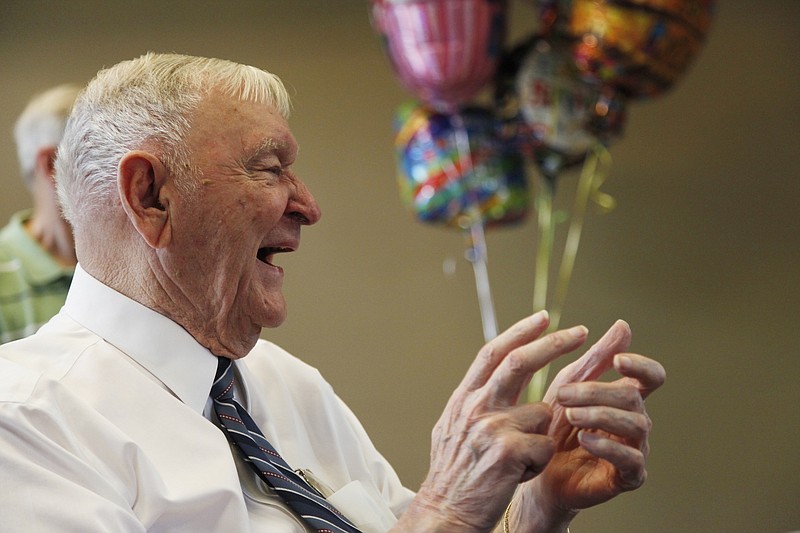When Chattanooga lost its 99-year-old hometown Medal of Honor recipient Charles Coolidge Wednesday, it lost more than a man honored with the country's highest and most prestigious military decoration. It also lost a man of values whose like is disappearing all too rapidly from our increasingly self-centered nation.
His exploits often have been recounted in this newspaper, and his name is known by area residents in the presence of Coolidge Park, the Charles H. Coolidge National Medal of Honor Heritage Center and a stretch of U.S. Highway 27.
Coolidge's courageous deeds in assembling a group of 28 disparate soldiers in the mountains of France in October 1944 and holding off German troops and tanks through four days of continuous fighting are indeed the stuff of which legends are made.
But it was in his remaining 76-plus years that he also displayed the character traits of courage, sacrifice, patriotism, citizenship, integrity and commitment for which the medal is awarded.
Displaying courage and sacrifice, for instance, Coolidge spent the final 50-plus years of his life with multiple sclerosis, about 38 of those in a wheelchair.
Doesn't seem quite fair, does it? But he never looked at it that way.
In an interview with the Times Free Press during the week of his 90th birthday 10 years ago, Coolidge said he went practically anywhere he wanted in his power scooter chair and his "honey" of a Chrysler van.
"I wouldn't be happy sitting at home," he said. "I have a nice house [on Signal Mountain] overlooking the river and Baylor School and looking at Lookout Mountain. Even though I don't walk, [God's] provided me with other ways."
Displaying patriotism and citizenship over what others may have thought was a slap in the face, Coolidge didn't grouse when a park named for him following the war was soon leased to the Navy for 49 years. Riverside Park, an expanse along the Tennessee River which featured tennis courts and a baseball diamond on which Coolidge had once played, was named for him in an elaborate 1945 ceremony. But within a short time it was shuttered to the public.
A lesser man might have made a stink about the issue, but Coolidge - selflessly - felt the Navy had a legitimate need for the area.
"Really, truthfully, it was fenced [to keep people out] most of those years," he said in 2011. "I think I was there once when a flagpole got put up. At the end of the 49 [years], I thought they'd lease it again for 49 more. But it works out."
Coolidge, fortunately, lived long enough to see the area turned into one of the city's gems.
Displaying integrity and commitment, the longtime Signal Mountain resident was offered and accepted a job after World War II with the Veterans Administration. Yet he returned to the family's Chattanooga Printing and Engraving business - started in 1910 - to help his father.
"I enjoyed [the Veterans Administration job]," he said shortly before turning 90, "actually more so than the printing business. But I thought [the business] needed me worse. [Work is] good for you. It keeps you active. I think everything works out for those that love the Lord."
People stay on the same job for just over four years today, according to the Bureau of Labor Statistics, and Coolidge might have had his pick of employment at the time. But he stayed with the business, not retiring until well into his 90s in 2017.
Retired Lt. Gen. Charles Coolidge Jr. told the Times Free Press in 2019 he thought integrity, of all the Medal of Honor character traits, fit his father best.
"My father is driven by his strong beliefs - belief in God, his love of country and devotion to family," he said. "My father is a role model for 'The Greatest Generation,' and for posterity. He knows that it takes years to earn and sustain one's integrity and a minute to lose it by compromising one's integrity. Absolute integrity is a true measure of who [he] is."
Sixty years ago, John F. Kennedy, a man of Coolidge's generation, another World War II veteran, implored in his presidential inaugural address, "Ask not what your country can do for you - ask what you can do for your country."
It was how most in that generation lived their lives, putting the good of their country and their fellow man above themselves.
Today, the script has been flipped, and too many people only ask what their country will do for them and how soon it will do it.
For that reason, we're especially thankful for Charles Coolidge's example, not only of his bravado almost 77 years ago but of an everyday life lived with a character to which we all can aspire.
